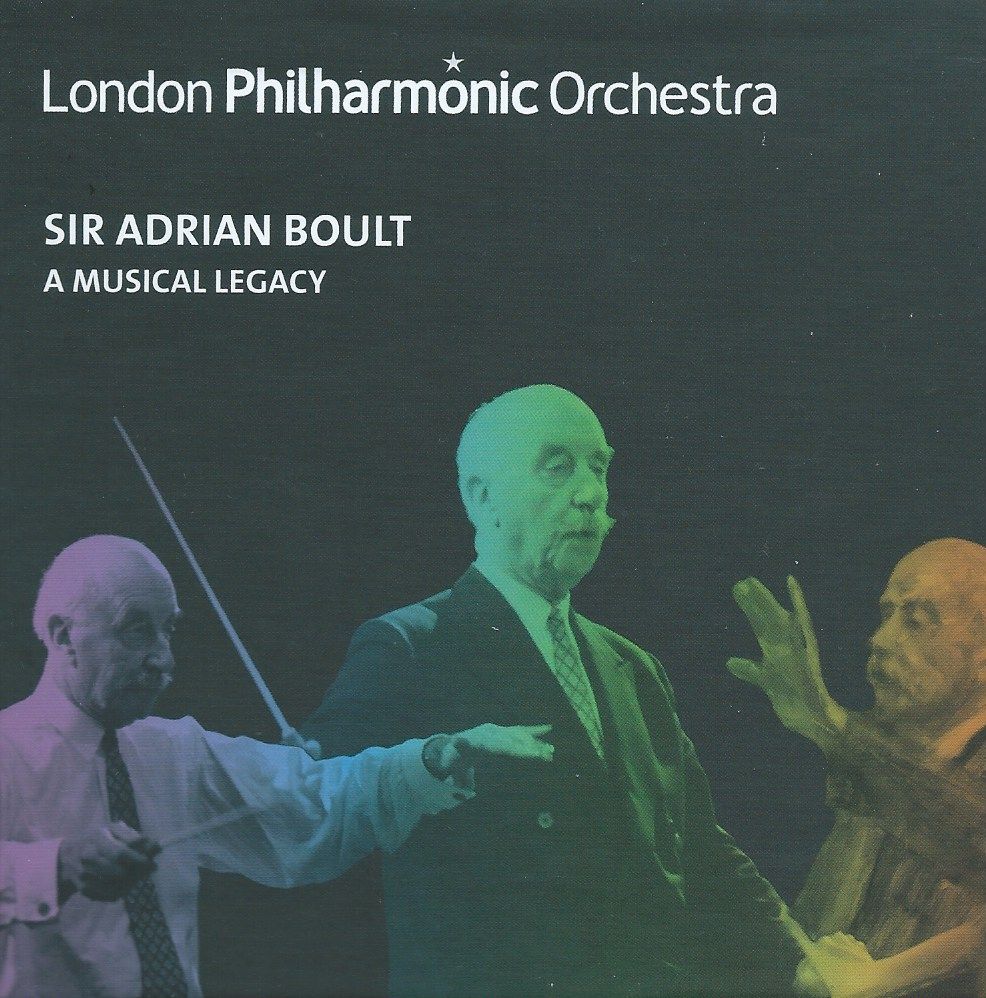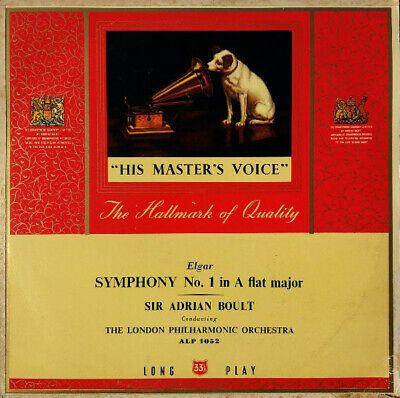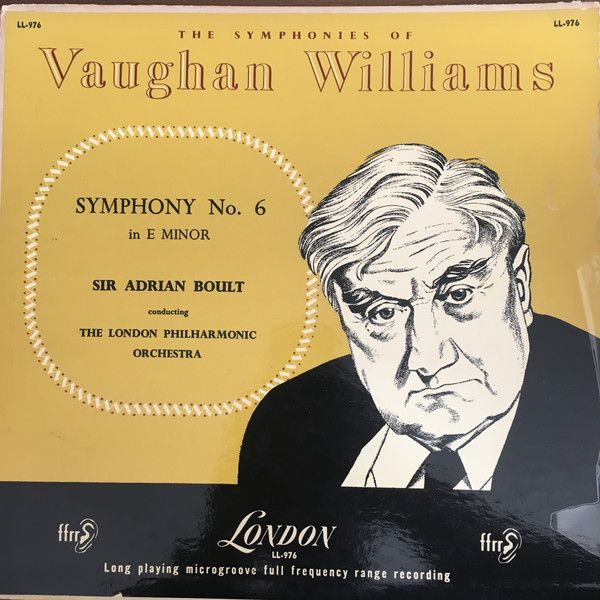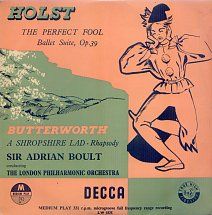Sir Adrian Boult: A Musical Legacy
A salutary reminder of the greatness of this most English of conductors

This spectacular, beautifully produced five-disc set from the London Philharmonic Orchestra's own label acts as a reminder of the genius of that most distinguished and upright of conductors, Sir Adrian Boult.
The sources for this set are mainly from vinyl, so original catalogue numbers are included for reference. Moving to the first piece, Elgar's Symphony No. 1 in A flat, Op. 55, some readers, I am sure, will hold this original dear:

Elgar Symphony No. 1 begins with a spacious Andante nobilmente e semplice:
Certainly plenty of that echt-Elgarian instruction "nobilmente" there; I'm not absolutely sure I hear that much "semplice" though. This is the first of three recordings Boult made with the LPO of Elgar 1 (ah, those were the days); and the first to be issued since the composer's own (this was recorded in October 1949; Elgar's was set down in 1930). The fairly swift tempos chosen by Boult give the work wings, as it were, particularly in the second movement Allegro molto, which has a very likeable lightness, the LPO on great form:
Boult stretches the Adagio inimitably, tenderly. Again, nobility is the touchstone; no sense of quasi-Mahlerian loitering, just pure Elgarian emotion:
The finale has grandeur, sweep and drama; the whole performance is impeccable in its resonance between conductor and score; and in its, well, Englishness. If you're not quite sure what I mean by that, listen to Daniel Barenboim's Elgar symphonies with the Staatskapelle Berlin, very much in the European Romantic tradition, which has its appeal but does rather take that edge off the core of the music (something I felt strongly when I heard those forces in the Second Symphony in the Proms in 2017, where Elgar was coupled with Birtwistle's Deep Time!). Here's Boult, exciting, his orchestra beautifully disciplined, his brass crowning the orchestra beautifully at the very close:
So which other Boult Elgar 1 would I supplement this with? The Lyrita LPO recording of the two symphonies, now on CD.
The Vaughan Williams Sixth Symphony (1947) is about as far as you can get from his better-known "London" Symphony (No. 2) or the "Sea Symphony" (No. 1). Powerfully craggy and dissonant, nothing is spared here. The set offers a transfer of the Decca London LP, released in 1955 in mono. The original release concluded with a short speech by the composer concerning this performance of his work that sadly is not included in this box, so here it is (including a sign of the times reference, perhaps, to the "gentlemen" of the orchestra and "to the lady harpist"):
This was released on a Decca London LP (just how nostalgic is this cover!) - the "ffrr" in the bottom left stands for "full frequency range recording":

The piece is utterly remarkable. Recorded in December 1953 with Ursula Vaughan Williams (the composer's wife) at the sessions, this is a piece of great power. That Epilogue the composer is referring to is perhaps the work's most notable feature; pianissimo throughout, and beautifully sustained (remember it was Boult who conducted the World Premiere of Vaughan Williams Sixth on April 21, 1948, with the BBC Symphony Orchestra). Here's the LPO finale:
Disc two takes us away from This Scepter'd Isle and over to Europe for, initially, Boult's "Eroica" (recorded in Walthamstow in June 1957). The recording itself scrubs up nicely; there is a real sense of momentum. This might not be the most dynamic of "Eroica"s (and there's no first movement exposition repeat), but it is one of the most detailed, and hearing the counterpoint in the woodwind in the first movement is a delight and a joy. The Adagio is just a touch over 13 minutes, making it swift; the momentum of the first movement hangs over it. This is a performance long on detail, and care (something one can hear in the tutti opening of the finale); but it does rather remind me there's a Furtwängler "Eroica" in the queue that will be the subject of a future post. It's an interesting performance, but don't buy the box for this!
Neither is Bruch a name one associates with Boult; and indeed this Kol nidrei is his only recording of that composer, with Christopher Bunting on cello in top form. The Dohnányi Variations on a Nursery Song, Op. 25 with pianist Patricia Bishop, is taken from a live performance at the Royal Festival Hall, the 1955 St Cecilia Day's Concert (along with the Arnold Organ Concerto, Elgar's In the South and Stanford Songs of the Fleet), transferred from discs at the British Library. The song in question is known to UK readers as "Twinkle, twinkle, little star" (known to Dohnányi, as it was to Mozart, as Ah! je vous dirai-je, Maman). Bishop's playing is splendidly light, and Boult has the LPO strings capture to perfection the dance-like sway of the music in the seventh variation, There's a more famous version with Julius Katchen that Boult recorded for Decca in 1954, and I attach it here for comparison purposes for those who purchase the set:
The third disc, "Music from the Ballet" begins with a nicely buzzing Ritual Fire Dance (Manuel de Falla), balanced at the other end of the disc by Stravinsky's frankly silly but irresistible Circus Polka (one wonders how this looked with that music set against Boult's famously minimal-expression conducting style); in between sit ballet suites from Delibes' Sylvia and Coppelia, plus the Valse from the Naïla ballet suite. Fascinating to hear Boult's recording of Holst's The Perfect Fool Suite, Op. 39; it really does feel as if the conductor has landed on home turf for this one. Suddenly it is impossible to consider alternative versions, such is the power and persuasiveness of the performance (and the exactitude of its execution). This 1955 version is taken from the 10-inch LP LW5175, where it was coupled with Butterworth's A Shropshire Lad.

The fourth disc is entitled "The Versatile Conductor"; it starts with Jeremiah Clarke (!), almost riotous in its joy and clearly in search of a Royal Wedding somewhere. Vaughan Williams' The Lark Ascending is perhaps predictably magnificent, with Jean Pougnet the superb solo violin, Hugh Bean would supplant him in Boult's New Philharmonia recording. Walton's Portsmouth Point is similarly excellent, bracing, bright; sandwiched between those two towers of British music is Sibelius' Lemminkäinen's Return, in an atmospheric performance.
One might not associate Boult with Bartók, but there is a performance of the Music for Strings, Percussion and Celesta here (Walthamstow, 1955) which grips from first to last, despite being one of the poorer transfers. The whole performance feels like an adventure, although the second movement Allegro feels somewhat unsettled. The Intermezzo from Wolf-Ferrari's I gioielli della Madonna (The Jewels of the Madonna) is a surprise, though, hardly core Boult territory but with a pronounced spring in its step; and lovely then to hear Gwenneth Pryor, light-fingered, in Saint-Saëns' "Wedding Cake" Caprice-Valse. true, Stephen Hough on Hyperion has nothing to worry about, but in place Pryor/Boult fits the bill quite nicely. The only casualty here is the Gershwin Cuban Overture, and that's mainly because the recording as a tendency to crowd.
Perhaps it is the flanking discs of this set that hold the greatest treasures. The fifth and final one is entitled "Champion of British Music" and begins with a fabulous four-out-of-the-five movements of Stanford Songs of the Fleet, Op. 117, which along with the Malcolm Arnold Organ Concerto, featured in the 1955 concert at the Festival Hall referenced above. The Stanford features baritone Frederick Harvey and the Croydon Philharmonic Society (the song "Fare Well" is the one which is omitted). Here's the atmospheric first, "Sailing at Dawn":
It's beautiful, and rousing, and perfectly paced. Stanford's music is undergoing something of a Renaissance, and here at Classical Explorer, we have perviously looked at several items: String Quartets Nos. 1, 2 & 6; Nos. 5 & 8; and Songs of Faith, Love and Nonsense. Boult's recording, although by no means in such fine sonics, remains an essential supplement to these.
The prolific composer Malcolm Arnold perhaps continues to polarise opinion. Good to hear his Organ Concerto, here with Hugh McLean as soloist. Many Arnold tropes are here: bright brass (he was a professional trumpeter - with the LPO, in fact, until he left to pursue his composition career in 1953), repetitive, jaunty rhythms, expert scoring, and, here, laudable brevity. Nothing outstays its welcome. Here's the first movement, Vivace:
There is ravishing beauty in the slow movement:
... and the way the organ garlands the textures with silvery tinsel in the finale is most fetching before more robust counterpoint takes over, itself ceding to a decidedly "Gothic" moment for organ before the trumpets once more hold sway:
It's a hard choice whether to quote Butterworth's A Shropshire Lad or Bax's The Garden of Fand. Both are amazing performances, but perhaps the Bax is more substantial as a piece:
The set closes with an Elgar In the South Overture. We mentioned Barenboim before, and when it comes to Elgar's extended stand-alone orchestral pieces, one could see Boult's impeccably tasteful In the South as complementary to Barenboim's "internationalist" way with Elgar's Falstaff. The way Boult shapes the themes of In the South and gives the beauty of the score the space it deserves is positively revelatory.
A salutary reminder of the greatness of this most English of conductors.
